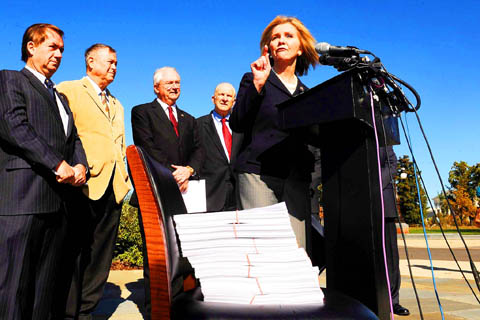US President Barack Obama was scheduled to visit Capitol Hill yesterday to try to close the sale on his signature healthcare overhaul, facing a make-or-break vote in the House of Representatives certain to be seen as a test of his presidency.
Obama scheduled a late-morning visit with House Democrats convening a rare Saturday session on legislation to remake the US healthcare system, extending coverage to tens of millions now uninsured and banning insurance company practices such as denial of coverage based on pre-existing medical problems.
Late on Friday, House Democrats cleared an abortion-related impasse blocking a vote and officials expressed optimism they had finally lined up the support needed to pass Obama’s signature issue.

PHOTO: EPA
Under the arrangement, abortion opponents were promised an opportunity to insert tougher restrictions into the legislation during debate on the House floor.
The leadership’s hope is that no matter how that vote turns out, Democrats on both sides of the abortion divide will then unite to give the healthcare bill a majority over unanimous Republican opposition.
With Democrats’ command of the necessary votes looking tenuous in the final hours, Obama threw the weight of his administration behind the effort to round up support. He and top administration officials worked the telephones to pressure wavering lawmakers.
Democratic Representative Jason Altmire said he heard on Friday from Obama, White House Chief of Staff Rahm Emanuel, Health and Human Services Secretary Kathleen Sebelius and Education Secretary Arne Duncan.
Their message: “This is a historic moment. You don’t want to end up with nothing,” said Altmire, who remained undecided.
Democratic leaders hoped to hold the vote last night, but Majority Leader Steny Hoyer said it could slip. Democrats hold 258 seats in the House and can afford 40 defections and still wind up with 218, a majority if all lawmakers vote. All 177 Republicans are expected to vote “no.”

MORE VISITORS: The Tourism Administration said that it is seeing positive prospects in its efforts to expand the tourism market in North America and Europe Taiwan has been ranked as the cheapest place in the world to travel to this year, based on a list recommended by NerdWallet. The San Francisco-based personal finance company said that Taiwan topped the list of 16 nations it chose for budget travelers because US tourists do not need visas and travelers can easily have a good meal for less than US$10. A bus ride in Taipei costs just under US$0.50, while subway rides start at US$0.60, the firm said, adding that public transportation in Taiwan is easy to navigate. The firm also called Taiwan a “food lover’s paradise,” citing inexpensive breakfast stalls

TRADE: A mandatory declaration of origin for manufactured goods bound for the US is to take effect on May 7 to block China from exploiting Taiwan’s trade channels All products manufactured in Taiwan and exported to the US must include a signed declaration of origin starting on May 7, the Bureau of Foreign Trade announced yesterday. US President Donald Trump on April 2 imposed a 32 percent tariff on imports from Taiwan, but one week later announced a 90-day pause on its implementation. However, a universal 10 percent tariff was immediately applied to most imports from around the world. On April 12, the Trump administration further exempted computers, smartphones and semiconductors from the new tariffs. In response, President William Lai’s (賴清德) administration has introduced a series of countermeasures to support affected

CROSS-STRAIT: The vast majority of Taiwanese support maintaining the ‘status quo,’ while concern is rising about Beijing’s influence operations More than eight out of 10 Taiwanese reject Beijing’s “one country, two systems” framework for cross-strait relations, according to a survey released by the Mainland Affairs Council (MAC) on Thursday. The MAC’s latest quarterly survey found that 84.4 percent of respondents opposed Beijing’s “one country, two systems” formula for handling cross-strait relations — a figure consistent with past polling. Over the past three years, opposition to the framework has remained high, ranging from a low of 83.6 percent in April 2023 to a peak of 89.6 percent in April last year. In the most recent poll, 82.5 percent also rejected China’s

PLUGGING HOLES: The amendments would bring the legislation in line with systems found in other countries such as Japan and the US, Legislator Chen Kuan-ting said Democratic Progressive Party (DPP) Legislator Chen Kuan-ting (陳冠廷) has proposed amending national security legislation amid a spate of espionage cases. Potential gaps in security vetting procedures for personnel with access to sensitive information prompted him to propose the amendments, which would introduce changes to Article 14 of the Classified National Security Information Protection Act (國家機密保護法), Chen said yesterday. The proposal, which aims to enhance interagency vetting procedures and reduce the risk of classified information leaks, would establish a comprehensive security clearance system in Taiwan, he said. The amendment would require character and loyalty checks for civil servants and intelligence personnel prior to